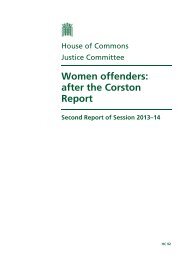Minority voices: Research into the access and acceptability of ... - MMC
Minority voices: Research into the access and acceptability of ... - MMC
Minority voices: Research into the access and acceptability of ... - MMC
- No tags were found...
Create successful ePaper yourself
Turn your PDF publications into a flip-book with our unique Google optimized e-Paper software.
! Concerns about <strong>the</strong> provision <strong>of</strong> mental health services for Black <strong>and</strong>minority ethnic communitiesSince 2001 awareness <strong>of</strong> <strong>the</strong> particular difficulties facing Black <strong>and</strong> minority ethniccommunities has been considerably heightened through <strong>the</strong> publication <strong>of</strong> a number <strong>of</strong>important reports <strong>and</strong> consultation documents, including:• Inside Outside published by NIMHE 14 (see initial quote above) which also states: “Atpresent, <strong>the</strong>re is no national strategy or policy specifically intended to improve ei<strong>the</strong>r<strong>the</strong> mental health <strong>of</strong> minority ethnic groups or <strong>the</strong>ir care <strong>and</strong> treatment within mentalhealth services. Previous approaches taken to address <strong>the</strong>se problems have been ei<strong>the</strong>rfragmented or selective. As a result, <strong>the</strong> ‘ethnicity agenda’ within mental healthservices has tended to become ei<strong>the</strong>r marginalised or ignored.”• Breaking <strong>the</strong> Circles <strong>of</strong> Fear by <strong>the</strong> Sainsbury Centre for Mental Health which highlightsthat “<strong>the</strong> care pathways <strong>of</strong> Black people are problematic <strong>and</strong> influence <strong>the</strong> nature <strong>and</strong>outcome <strong>of</strong> treatment <strong>and</strong> <strong>the</strong> willingness <strong>of</strong> <strong>the</strong>se communities to engage withmainstream services.” 15 This document also notes “<strong>the</strong> need for changes to mentalhealth care <strong>and</strong> treatment <strong>of</strong> Black people is widely recognised <strong>and</strong> long overdue. Thereis compelling research <strong>and</strong> statistical evidence which shows that Black <strong>and</strong> AfricanCaribbean people are over-represented in mental health services <strong>and</strong> experience pooreroutcomes than <strong>the</strong>ir White counterparts.”• The FOCUS report, which highlights <strong>the</strong> importance <strong>of</strong> recognising “<strong>the</strong> diversity <strong>of</strong>individual needs <strong>and</strong> cultures” if we are to truly underst<strong>and</strong> <strong>and</strong> address <strong>the</strong> needs <strong>of</strong>minority ethnic groups. 16 This work also draws attention to <strong>the</strong> complexities <strong>of</strong> definingethnicity, <strong>the</strong> limitations <strong>of</strong> census data, <strong>and</strong> <strong>the</strong> paucity <strong>of</strong> epidemiological research in<strong>the</strong> field <strong>of</strong> ethnicity <strong>and</strong> mental health in children <strong>and</strong> adolescents.• Delivering Race Equality: a Framework for Action, which states in <strong>the</strong> foreword:“improving <strong>the</strong> provision <strong>of</strong> services to Black <strong>and</strong> minority ethnic communities, <strong>and</strong>ensuring that those communities are not only informed, but also willing <strong>and</strong> able towork in partnership with services, are not merely matters <strong>of</strong> fulfilling statutoryobligations, important though those are. They are essential if we are to achieve ouroverall goals in modernising <strong>the</strong> health <strong>and</strong> social care system.” 17This report sets out <strong>the</strong> following - that people from Black <strong>and</strong> minority ethnic communities aremore likely to experience:• Problems in <strong>access</strong>ing services• Lower satisfaction with services• Cultural <strong>and</strong> language barriers in assessments• Lower GP involvement in care• Inadequate community-based crisis care• Lower involvement <strong>of</strong> service users, family <strong>and</strong> carers• Inadequate support for Black community initiatives• An aversive pathway <strong>into</strong> mental health services:- higher compulsory admission rates to hospital- greater involvement in legal system <strong>and</strong> forensic settings- higher rates <strong>of</strong> transfer to medium <strong>and</strong> high secure facilities• Higher voluntary admission rates to hospital• Lower satisfaction with hospital care• Lower effectiveness <strong>of</strong> hospital treatment• Longer stays in hospital• Less likelihood <strong>of</strong> having social care/psychological needs addressed within careplanning/treatment processes• More severe <strong>and</strong> coercive treatments• Lower <strong>access</strong> to talking treatments/<strong>the</strong>rapies<strong>Minority</strong> Voices <strong>Research</strong> Report8
















